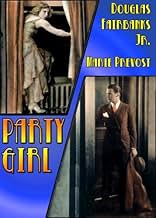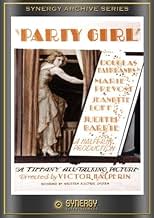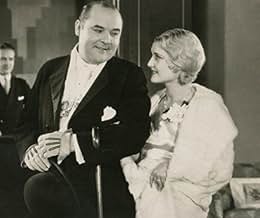Ajouter une intrigue dans votre langueA cautionary tale. Ellen's past as a "party girl" is carefully hidden but may be exposed when another party girl tricks her fiance into marriage.A cautionary tale. Ellen's past as a "party girl" is carefully hidden but may be exposed when another party girl tricks her fiance into marriage.A cautionary tale. Ellen's past as a "party girl" is carefully hidden but may be exposed when another party girl tricks her fiance into marriage.
- Réalisation
- Scénario
- Casting principal
Earl Burtnett
- Orchestra Leader
- (as Earl Burtnett and His Biltmore Orchestra and Trio)
Eddie Bush
- Member of Biltmore Trio - Guitar
- (non crédité)
Louise Carver
- Masseuse
- (non crédité)
Paul Gibbons
- Member of Biltmore Trio - Steel Guitar
- (non crédité)
Henry Roquemore
- Party Guest
- (non crédité)
Avis à la une
If you want to study good acting, this film is essential for, well, the flip side of the acting craft. The most basic line readings are spectacularly awful. My personal favorite: a woman, facing two policemen with overbearing warnings, saying, "so - long pause - what?" To be fair, though, the script, just the basic dialogue, is horrible and the plot is just the bare bones material for an audience to get a peek at a lurid world of 'party girls' and Prohibition-era 'gin parties.' The double-meanings are just a step more lurid than the thinly-veiled plots of other "A" pictures. While prostitution is the main theme, the look into how the rich flaunt the alcohol ban is sure to have titillated an audience of the era. The 'perfume' bath given to one of the girls is strongly suggested to be gin. And one cop notes before questioning a girl that the guilty go for a bottle before being interrogated. The class depictions in a film shot at the onset of the Depression also are stark. The rich drink and carouse with poor girls on the margins of society who, as the opening title says, want only to earn a living in a "decent" way. The message to women is clear enough: the workplace is no place for decent gals.
This tight little programmer (clocking in at just over 1 hour) is a real curio, Pre-Code of course. The film is designed to 'expose' the sordid underbelly of escort services who are only too happy to entertain men in high places(quite literally in this flick) for a fee. Like most movies of this genre, we are treated to a written prologue attesting to the scourge of the subject matter and how these sordid goings-on could be happening in our own town. This frequent framing device at the time would justify the seedy plot, in this case depicting between men of prestige and prosperity with call girls.
Marie Prevost is hot to trot in a secondary role as one of the 'ladies in waiting.' Miss Prevost did make the transition to sound almost seamlessly as an appealing blend between Betty Boop and Clara Bow. Yet, her fluctuating weight would unfortunately relegate her casting to this caliber of portrayals for the rest of her career.
Judith Barrie is the lead 'party girl' here who leads Douglas Fairbanks Jr. character, scion to millions of dollars, down that reckless road to potential ruin. Miss Barrie handles her role with zest and a very contemporary feel. It's a shame she would abandon Hollywood (or vice versa) in two years.
Then there's Doug Fairbanks Jr. who always adds a note of prestige to any frame he appears in. On the threshold of stardom ('LITTLE CAESAR' would be beckoning soon) the swashbuckler's son is treating this role of a young bon vivant who is caught up in Miss Barrie's web of deceit and degradation like a walk in the park. Well, this is a Personality Pictures production, after all. This would be equivalent to summer stock for an A list actor waiting for that phone call from his agent with that really plum role at a 'major' studio.
Of course, there is an obvious moral to our story which is hastened after an on screen tragedy which is quite jolting.
Yet, when the lights come back on, it's still hard to forget those vehicles, packed with eager customers, transported by elevator directly to the 'party girls' living room, the ultimate drive-in escort service.
Marie Prevost is hot to trot in a secondary role as one of the 'ladies in waiting.' Miss Prevost did make the transition to sound almost seamlessly as an appealing blend between Betty Boop and Clara Bow. Yet, her fluctuating weight would unfortunately relegate her casting to this caliber of portrayals for the rest of her career.
Judith Barrie is the lead 'party girl' here who leads Douglas Fairbanks Jr. character, scion to millions of dollars, down that reckless road to potential ruin. Miss Barrie handles her role with zest and a very contemporary feel. It's a shame she would abandon Hollywood (or vice versa) in two years.
Then there's Doug Fairbanks Jr. who always adds a note of prestige to any frame he appears in. On the threshold of stardom ('LITTLE CAESAR' would be beckoning soon) the swashbuckler's son is treating this role of a young bon vivant who is caught up in Miss Barrie's web of deceit and degradation like a walk in the park. Well, this is a Personality Pictures production, after all. This would be equivalent to summer stock for an A list actor waiting for that phone call from his agent with that really plum role at a 'major' studio.
Of course, there is an obvious moral to our story which is hastened after an on screen tragedy which is quite jolting.
Yet, when the lights come back on, it's still hard to forget those vehicles, packed with eager customers, transported by elevator directly to the 'party girls' living room, the ultimate drive-in escort service.
Party Girl (1930)
** (out of 4)
Jay Rountree (Douglas Fairbanks, Jr.) is the son of a wealthy banker who spends most of his time borrowing money from dad so that he and his friends can drink and have a good time. Jay ends up at a party and meets Leeda (Judith Barrie) and the next morning she cries that he "ruined" her good girl quality so the weak Jay marries her with no questions asked. This here breaks his heart because he wanted to marry his dad's secretary (Jeanette Loff) but before long he realizes that Leeda is a prostitute who is used at business parties to lure suckers.
Victor Halperin would make a name for himself two years from this film when he directed the Bela Lugosi film WHITE ZOMBIE so it's interesting getting to see something earlier. This film here starts off like a lot of the exploitation pictures of the era with a "warning" telling people that a party girl is a prostitute who tries to get her nails into men and ruin their lives with various scams. I did find it funny that this was warning people against these leech hookers yet they never bothered to tell men to just stay away from them!
With that said, I must admit that I was really shocked to see Fairbanks, Jr. in this role. This was obviously done when he was a struggling actor but it's still strange to see a name like his attached to what's basically a very low-budget exploitation movie. What's even more shocking is that he managed to go on and become a fine actor because his performance here is quite awful. Just check out the scenes where he's pouting about having to get married. Yikes. Loff isn't much better as the prostitute but Barie is good in her small role.
PARTY GIRL is certainly worth watching if you're a fan of exploitation movies or if you want to see an early film from Fairbanks where he's not all that good. Overall the film runs just over a hour so it's decent enough to make it worth watching.
** (out of 4)
Jay Rountree (Douglas Fairbanks, Jr.) is the son of a wealthy banker who spends most of his time borrowing money from dad so that he and his friends can drink and have a good time. Jay ends up at a party and meets Leeda (Judith Barrie) and the next morning she cries that he "ruined" her good girl quality so the weak Jay marries her with no questions asked. This here breaks his heart because he wanted to marry his dad's secretary (Jeanette Loff) but before long he realizes that Leeda is a prostitute who is used at business parties to lure suckers.
Victor Halperin would make a name for himself two years from this film when he directed the Bela Lugosi film WHITE ZOMBIE so it's interesting getting to see something earlier. This film here starts off like a lot of the exploitation pictures of the era with a "warning" telling people that a party girl is a prostitute who tries to get her nails into men and ruin their lives with various scams. I did find it funny that this was warning people against these leech hookers yet they never bothered to tell men to just stay away from them!
With that said, I must admit that I was really shocked to see Fairbanks, Jr. in this role. This was obviously done when he was a struggling actor but it's still strange to see a name like his attached to what's basically a very low-budget exploitation movie. What's even more shocking is that he managed to go on and become a fine actor because his performance here is quite awful. Just check out the scenes where he's pouting about having to get married. Yikes. Loff isn't much better as the prostitute but Barie is good in her small role.
PARTY GIRL is certainly worth watching if you're a fan of exploitation movies or if you want to see an early film from Fairbanks where he's not all that good. Overall the film runs just over a hour so it's decent enough to make it worth watching.
That scene of the big old car rolling onto the penthouse party floor as though it's an everyday occurrence really grabbed me. Then too, the guests acting like it's an everyday occurrence surprised me even more. Seems as though building elevators were big enough to lift any such cargo in those days. Plot-wise, the flick's got plenty of innuendo and filmy dresses, but never goes beyond that suggestive stage. Looks like even pre-Code had its unwritten limits.
Anyway, the interweaving of sexual scheming and big business likely pleased Depression-era audiences already made cynical by the Wall Street crash of '29. Fairbanks is the hormonal pidgeon of sexy Barrie's plotting, even though he likes the virginal Lott more. Nonetheless, there's riches to be made once the party girls expedite big money deals. So guys and gals do party-on. Meanwhile, Fairbanks' movie dad, St. Polis, makes a fittingly imperious business kingpin, lording it over his listless son. How the various schemes play out makes up the often ragged storyline.
Anyhow, the party girls are all richly upholstered and do well, unlike Fairbanks Jr who appears too bland to score beyond his illustrious family name. Overall, it's a revealing flick at a time when the free-wheeling 1920's were coming to an inglorious end.
(In Passing - on a more somber note: too bad actresses Barrie and Prevost had such sad early ends, {IMDB}. Happily, their contributions live on.)
Anyway, the interweaving of sexual scheming and big business likely pleased Depression-era audiences already made cynical by the Wall Street crash of '29. Fairbanks is the hormonal pidgeon of sexy Barrie's plotting, even though he likes the virginal Lott more. Nonetheless, there's riches to be made once the party girls expedite big money deals. So guys and gals do party-on. Meanwhile, Fairbanks' movie dad, St. Polis, makes a fittingly imperious business kingpin, lording it over his listless son. How the various schemes play out makes up the often ragged storyline.
Anyhow, the party girls are all richly upholstered and do well, unlike Fairbanks Jr who appears too bland to score beyond his illustrious family name. Overall, it's a revealing flick at a time when the free-wheeling 1920's were coming to an inglorious end.
(In Passing - on a more somber note: too bad actresses Barrie and Prevost had such sad early ends, {IMDB}. Happily, their contributions live on.)
Vaguely hysterical exploitation pic in which wastrel rich kid Douglas Fairbanks Jr finds himself tricked into marriage by a prostitute after he and his mates crash a boozy party. Needless to say, Daddy isn't impressed, and neither is love interest Jeannette Loff who was once herself a "party girl." It's the kind of movie that disappeared from movie screens for a couple of decades once the Production Code came into force, but the worst you see is young women sitting on old men's laps.
Le saviez-vous
- AnecdotesThe film holds the record for longest UK film ban. The BBFC banned the film in 1930. It was finally released, with a PG rating, in 2003.
- Citations
Diana Hoster: [answering phone from a massage table, butt-naked--literally; this is pre-code] Di Hoster speaking, in the flesh.
- ConnexionsFeatured in Hollywood Uncensored (1987)
- Bandes originalesOh! How I Adore You
Words and Music by Harry Stoddard and Marcy Klauber
Copyright 1930 by Shapiro, Bernstein & Co
Meilleurs choix
Connectez-vous pour évaluer et suivre la liste de favoris afin de recevoir des recommandations personnalisées
Détails
- Durée
- 1h 7min(67 min)
- Couleur
- Rapport de forme
- 1.37 : 1
Contribuer à cette page
Suggérer une modification ou ajouter du contenu manquant

































